It’s time for lifelong learning to grow up.
That’s what Degreed CEO David Blake said at Degreed LENS 2024. And he’s right. Lifelong learning, as it stands today, is begging to be re-energized and innovated.
“Today, we lifelong learn like most of us exercise, which is ‘kinda-sorta.’ It isn’t good enough. Not anymore,” Blake said. The takeaway? It’s time to make lifelong learning a bigger priority through better opportunities and bolder innovations.
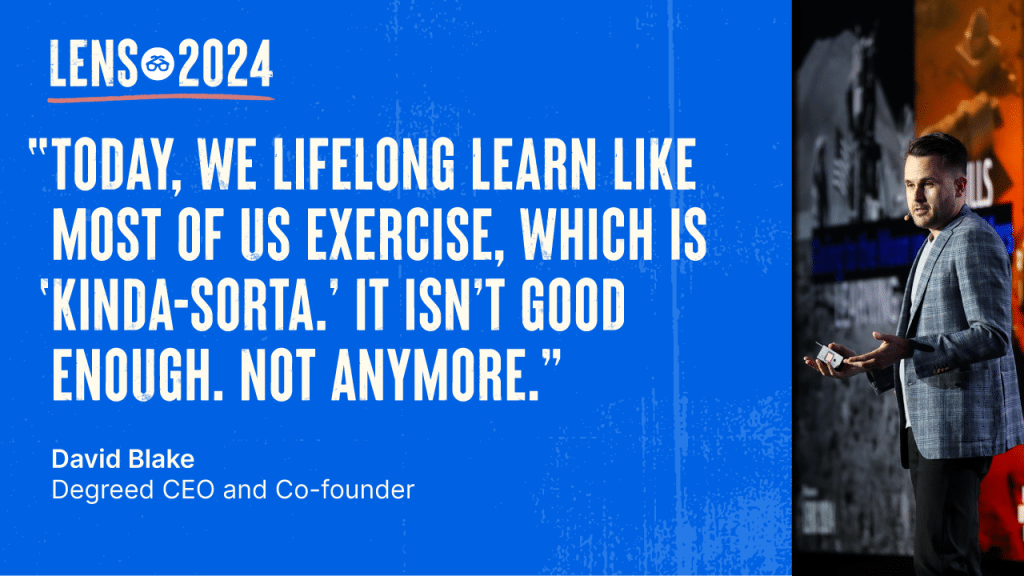
What does innovative lifelong learning look like? That future is still being shaped, but Blake said one way to picture it is in terms of the familiar university model, but for life—learners are always enrolled in a “semester,” have a transcript of what they’ve learned and how, can advance with cohorts or “study groups,” and so much more.
Similarly, Michelle Weise, Founder and Upskilling Advisor at Rise & Design, re-affirmed that organizations will have to change how they view workforce development in the years ahead. “All companies and organizations need to understand that the workplace is going to become the classroom of the future,” Weise said during her LENS keynote.
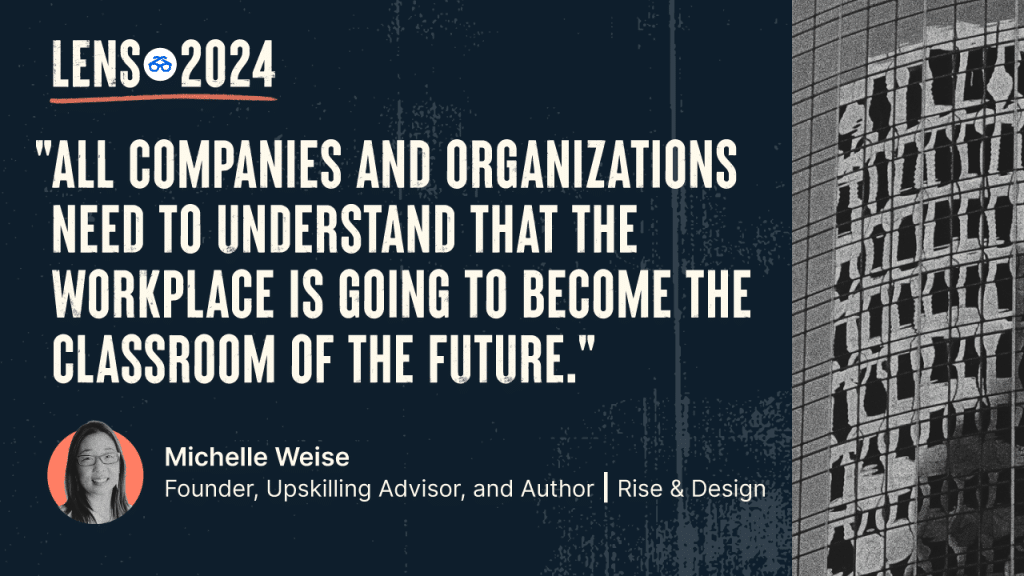
Transforming the workplace into a haven of growth and opportunities will take work. It will take buy-in, strategy, and collaboration. L&D professionals from around the world gathered March 5 and 6 at LENS to learn, share, innovate—and prepare for the coming transformation together.
Three key ideas emerged that will light the path: skills, data and business alignment, and artificial intelligence (AI).
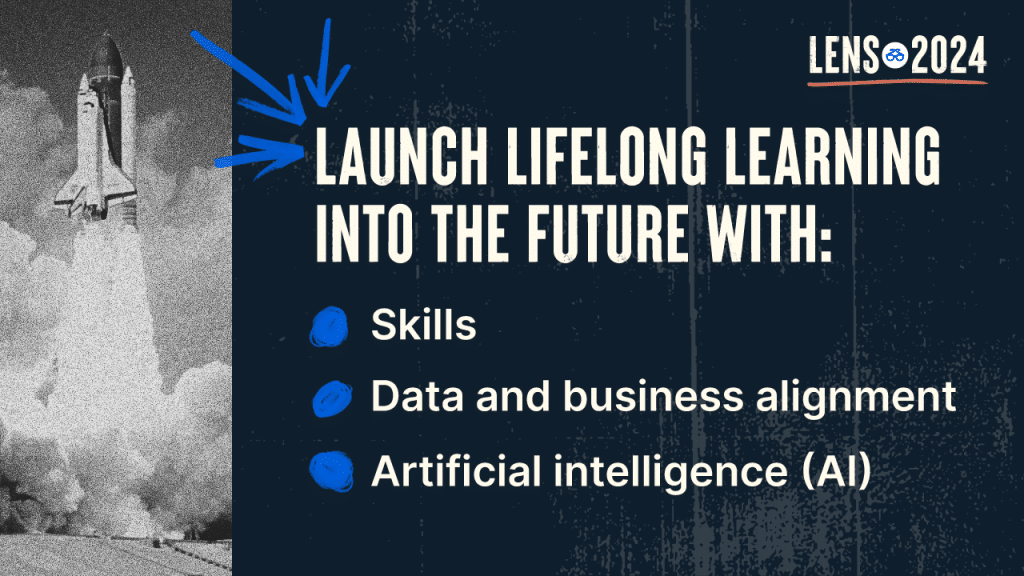
Skills
Just start experimenting with skills. Your path and goals will change, and that’s okay.
“Skills are hot, but they’re not new,” Barrett Evans, Head of Global Learning and Leadership Development at Ford, said from the LENS stage.
Skills have been around forever. What’s changing is how we measure and leverage them in business. So take what you do know about skills and apply it to what you still need to find out about your workforce and its capabilities.

The path to becoming a skills-based (or skills-first) organization is fluid. It’s not yet defined. But if you wait for certainty to act, your competitors are likely to master the art of leveraging skills before you’ve even tried. The work world is switching from an economy based on jobs to an economy based on skills. And if you aren’t skills-first, you’re essentially skills-last.
Simplify your skills strategy. Make it dynamic.
Peter Sheppard, Head of Learning Ecosystem at Ericsson, and Vidya Krishnan, Chief Learning Officer at Ericsson, realized a need for automation that keeps their skills model modernized, agile, and ready for anything. The life of a skill can be short. So they created a digital job architecture, a dynamic skills taxonomy, a new catalog of skills, and more that made applying skills easy for employees and management alike.
And it’s not just skills that need to be dynamic. It’s employees too. With the right development opportunities in place, you can help them grow, innovate, and succeed. “The people we have must continually become the people we need,” Krishnan said.
The Ericsson team relied on Degreed partners—like SAP SuccessFactors—to help employees understand the criteria for open internal opportunities, further propelling growth. Developing that kind of self-perpetuating skills cycle is the dream. It ensures your skills strategy consistently produces positive results.
With the right business alignment in place, that skills cycle can become integrated into the core of your organization.
Data & Business Alignment
Understand key company goals, and help stakeholders succeed.
“At the end of the day, we’re all in business to be able to drive competitive advantage, and it’s the people that do that, right?” said Brad Watt, CLO at Colgate-Palmolive.
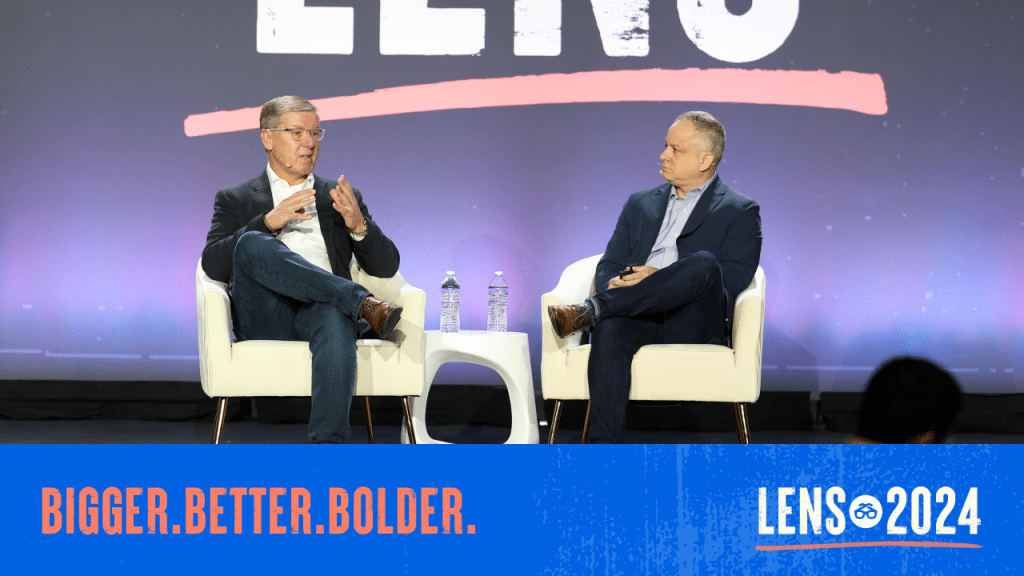
Businesses need people to learn, grow, and develop because static people produce ineffective work. At the same time, different business units need to see different kinds of growth. The easiest way for L&D to illustrate its impact is to connect with stakeholders, uncover opportunities to help meet unique objectives, and then use resulting data to show how learning contributed.
At Colgate-Palmolive, for example, the L&D team implemented badging. The result? A whopping 3,500 people earned badges in 2022. The HR team benefitted from that because employees felt recognized for the work they were doing and shared their badges on social media. As a result, HR saw more employee satisfaction and more organic employer brand building. That’s alignment.
Tell the right story to the right people.
No business unit or stakeholder will appreciate the impact of learning if you don’t present that impact in a clear and engaging way. As part of an L&D team, it’s in your scope to translate learning and skills data to make it meaningful across teams.
“If we don’t help them [stakeholders] with the context, they’re going to reach their own context, and we may not have the same interpretations of that data.” said Greg Smith, Director of Learning and Development at Associa.
That potential for misinterpretation further underscores the need for alignment, so when the data comes in, you know what the right story is and who to tell it to. And if you’re still not sure, maybe AI can help.
AI
Take responsibility for shaping AI into what you want it to be.
New AI tools are like baby tigers, Noelle Russell, Chief AI Officer at the AI Leadership Institute, told LENS. People are filled with fascination and curiosity about the cute, seemingly harmless baby cat, and everyone wants to play with it. But if it’s not raised with guardrails, it has the potential to be lethal. And even if AI is raised responsibly? “We don’t let our guard down. Ever,” Russell urged.
According to Weise, workers who used to be the most concerned about being replaced by machines were those without college degrees. Now, it’s people with college degrees.
In a direct nod to workforce worries about AI, Russell encouraged employees to ask how AI can help them do the parts of their jobs that they don’t like—rather than the ones they do.
Humans make AI, and humans decide how to use it. If it can help with menial, time-consuming tasks, it has the potential to help people enjoy work more. So ask your teams what parts of their jobs they’d love AI to help with. Ask yourself too, and then make it happen.
Build new skills to adapt to AI, but don’t discount the ones you already have.
With a technological leap as significant as AI, feeling the limits of your own skills is natural. But the need for new skills doesn’t suddenly make existing skills irrelevant. Gary J. Lutz, Learning Technology Manager at Intel Corporation, and Jim Hemgen, Talent Development Director at Booz Allen Hamilton, discussed this transition during their LENS session on AI experimentation.
“I, at this point, don’t see skills that necessarily become less important,” Lutz said. “I do see skills that we need to add. And it’s not just skills we need to add to the organization. Every individual needs to add these skills to their own repertoire.”
The question is not which skills are now irrelevant; rather, it’s which skills are up-and-coming to tackle this new technological opportunity? As dietitians say about sustainable healthy eating, don’t look at what you can cut out, look at what you can add in.
Lutz and Hemgen named a few AI-critical skills, including:
- Cybersecurity
- AI prompt engineering
- Performance consulting
- Critical thinking
- AI literacy
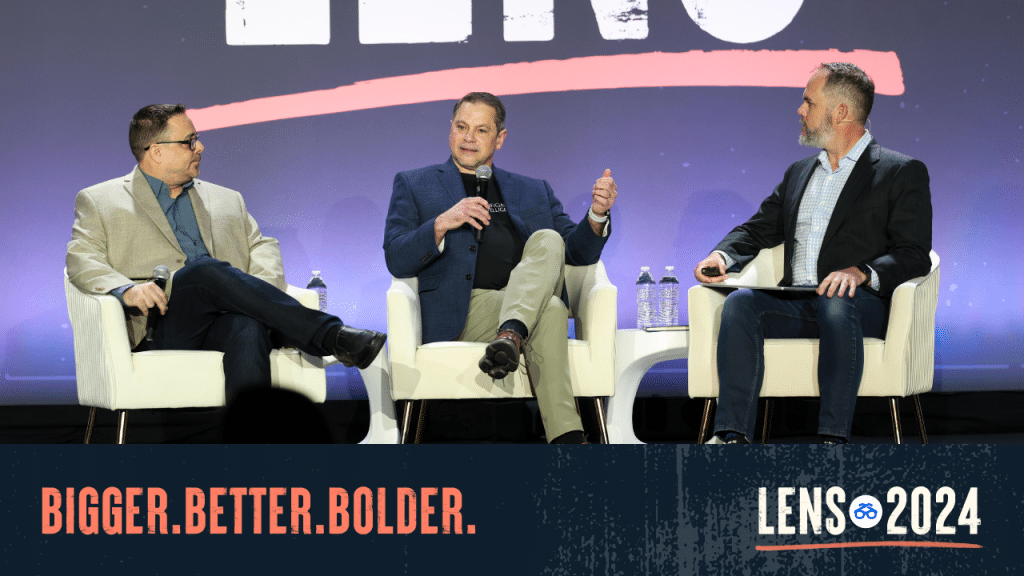
Launching into the Future of Work
The value of upskilling can’t be overstated as the world continues to grow and change. Skills, data and business alignment, and AI—when done right—can help you forge your organization’s path to success. As the L&D industry works to shape lifelong learning into a pillar of the work world, the global insights from LENS 2024 will hopefully stay with you and help you blaze a clear path to a skills-first future.
Ready to learn more?
To find out more about Degreed, schedule a demo today.
